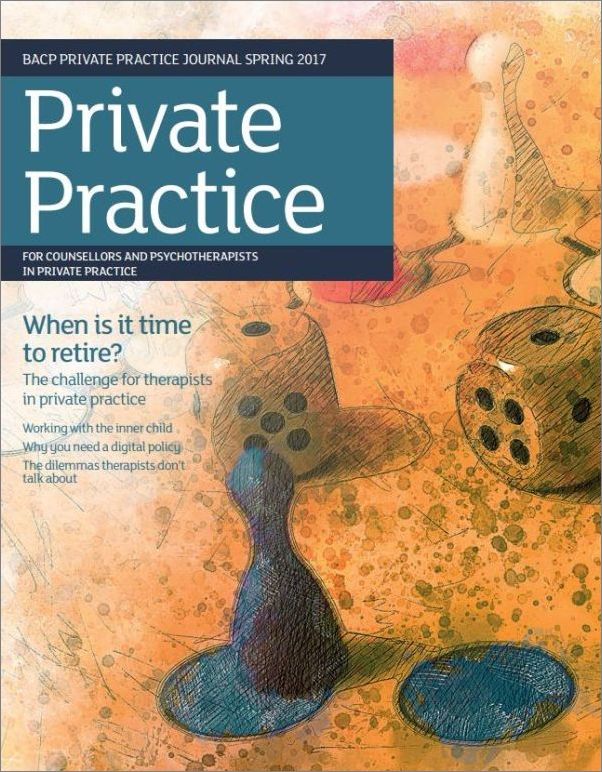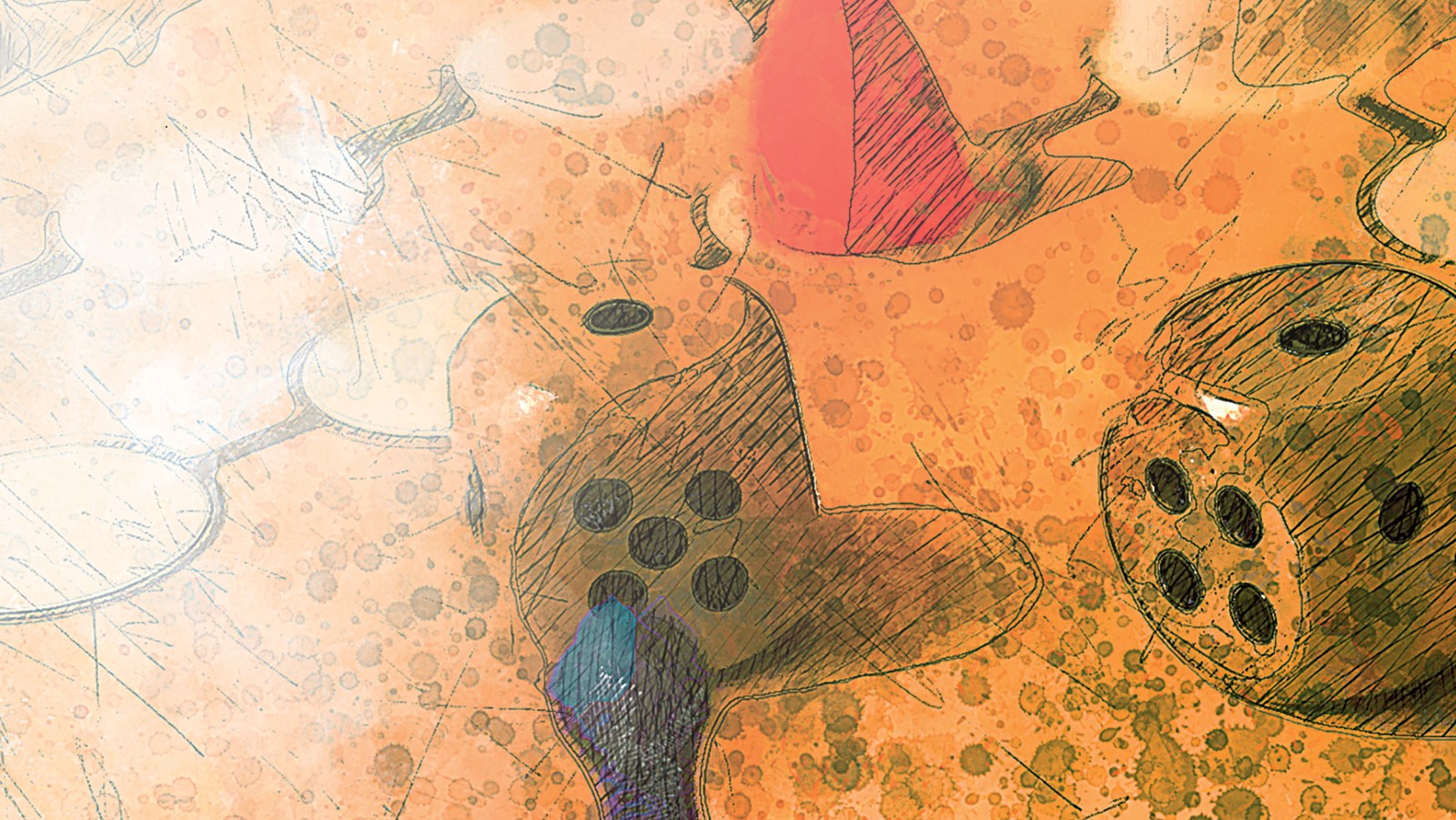In this issue
Features
Feel the fear
Jo Bisseker Barr explains how facing her fears on the ski slope helped her to relate better to her clients
The child within
Catherine O’Riordan on how she uses the metaphor of the ‘inner child’ to help clients with painful past memories
The dilemmas therapists don’t talk about
Michael Soth argues that by addressing some neglected areas of our discipline, therapy can work better for therapists as well as clients
When is it time to retire? (free article)
Anne Power explores issues faced by therapists facing retirement
Regulars
Ask an expert (free article)

A pdf version of this issue is available from the Private Practice archive
Welcome from the editor
Writing in The Arrow: A journal of wakeful society, culture, and politics,1 Associate Professor in the Faculty of Information and Media Studies at the University of Western Ontario, Ajit Pyati, states: ‘With nationalist and populist waves washing over the globe, many of us within the contemplative world may be feeling upset and disappointed. We might be asking ourselves how nativist and xenophobic sentiments can have such popular support, particularly given the dangerous historical precedents of these trends.’
Pyati goes on to argue that ‘dismissing the changes we are witnessing as misguided and ignorant would miss the point. In particular, many citizens in the United States, Europe, and other parts of the world are acting out of a sense of anxiety about their identities in a rapidly changing world riven by global capitalism’s savage inequities.’
As therapists, recognising, acknowledging, understanding and potentially ultimately liberating both our selves and our clients from the various identities we have internalised from our cultural and historical context, family system, biology and society, is core to our work. As is the ability to reflect deeply on how issues of diversity and difference relating to those identities (both visible and invisible) – our gender, class, age, ethnicity, sexuality, physical and learning ability etc – will impact on our work with clients.
In the West, we are experiencing the emergence of the shadow side of a liberal age that has seen such positive progress towards protecting the human rights of all in society; the politics of scapegoating and blame is once again on the rise. There is no more pressing a time then to be focusing as a profession on the theme of identity – our sameness and our difference – so it’s great that this will be the focus of this year’s BACP Private Practice conference, titled ‘Identity: Can you tell me who I am?’, on Saturday 23 September.
Alongside being encouraged to register as a delegate, we are inviting members who have specialist expertise in an area of work relating to the conference theme, to deliver a session. The submission deadline for proposals is Friday 21 April 2017.
A key part of personal identity is wrapped up in what we do for a living and this can be especially true for therapists, as we frequently have a strong sense of vocation and personal investment in practising, having often been drawn into training out of a need to heal ourselves. This attachment to the role can be a source of internal conflict when it comes to having to let it go, perhaps temporarily as the result of a life crisis or change in personal circumstance, like having a baby, or permanently when age and physical or mental impairment make it no longer possible to continue. Anne Power writes about the experiences of retired and retiring therapists and you can read about her research findings in her article.
Returning to the archetype of the wounded healer, which he asserts is central to our work, in the last of a four-part series for this journal, Michael Soth writes about the importance of being aware of the ways in which we – consciously and unconsciously – ‘construct’ therapy and engage with our clients through the lens of our own early attachments and family system. He points out that many of us will have been subliminally assigned and assumed the role of ‘family therapist’ in childhood, where our powerlessness to transform our parents’ neurosis and pain will have been our first experience of ‘failure at the job’. The risk then is that we might go on to project our early developmental woundings into our consulting room and onto our clients, and feel just as helpless when we can’t make them better either. This, he concludes, ‘is probably the biggest drain on our practice’.
Coming back to the question of identity, Michael warns that ‘too much training is focused on theories and techniques’ and that ‘our therapeutic identity, when defined in terms of our theories and techniques, can become another persona, an outer shell and shield’.
Roberto Assagioli, the founder of psychosynthesis, the approach in which I am trained, wrote: ‘We are dominated by everything with which our self becomes identified. We can dominate and control everything from which we dis-identify ourselves.’ He was influenced by what wisdom traditions have to tell us about issues of identity. For instance, Buddhist philosophy, which speaks of all phenomena being interrelated and that ultimately identity is about the realisation of anatta, or ‘no-self’, and yogic philosophy, which shares with Buddhism the concept that our everyday sense of identity is illusory and fails to capture the actual profoundness of existence. In psychosynthesis terms, whatever we are identified with controls us and so, conversely, whatever we dis-identify from, we have choice about.
Pyati picks up on these points in his article in The Arrow and, with these in mind, asks how they might be applied to current global crises. He concludes: ‘…we need to understand that while most forms of identity are limited, the need for identity remains a powerful and natural human need. Therefore, we must focus on the important role of community in contemplative traditions to support healthy and grounded senses of identity in today’s world.’
John Daniel, editor
privatepractice.editorial@bacp.co.uk
References
1. Pyati A. Interrogating the nature of identity in an age of rising nationalism. The Arrow: A journal of wakeful society, culture, and politics. [Online.] http://arrow-journal.org/interrogating-the-nature-of-identity-in-an-age-of-risingnationalism/(accessed 4 March 2017).
2. Assagioli R. Psychosynthesis: a collection of basic writings. London: MacMillan; 1971.
